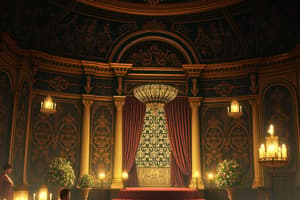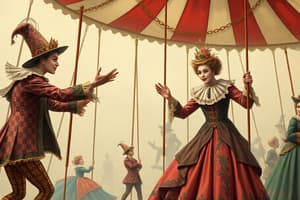Podcast
Questions and Answers
Quel terme désigne l'illusion de réalité dans une représentation théâtrale ?
Quel terme désigne l'illusion de réalité dans une représentation théâtrale ?
- Effet théâtral
- Hors-scène
- Intrigue secondaire
- Effet de réel (correct)
Quel effet met l'accent sur le caractère artificiel de la représentation théâtrale ?
Quel effet met l'accent sur le caractère artificiel de la représentation théâtrale ?
- Leitmotiv
- Ellipses
- Effet théâtral (correct)
- Effet de réel
Quelle technique permet d'accélérer l'intrigue ou de rendre le récit ambigu ?
Quelle technique permet d'accélérer l'intrigue ou de rendre le récit ambigu ?
- Ellipse (correct)
- Hors-scène
- Metteur en scène
- Ironie
Quel terme désigne les événements qui influencent l'action mais ne sont pas visibles par le public ?
Quel terme désigne les événements qui influencent l'action mais ne sont pas visibles par le public ?
Comment est définie l'intrigue d'une pièce ?
Comment est définie l'intrigue d'une pièce ?
Quelle forme d'ironie se produit lorsque le public connaît des éléments que les personnages ignorent ?
Quelle forme d'ironie se produit lorsque le public connaît des éléments que les personnages ignorent ?
Quelle est la fonction principale d'un leitmotiv dans une pièce de théâtre ?
Quelle est la fonction principale d'un leitmotiv dans une pièce de théâtre ?
Qui est responsable de la mise en scène et de l'organisation d'une pièce ?
Qui est responsable de la mise en scène et de l'organisation d'une pièce ?
Quelle est la fonction d'un acte dans une pièce de théâtre ?
Quelle est la fonction d'un acte dans une pièce de théâtre ?
Quel est le rôle principal du chœur dans le théâtre ?
Quel est le rôle principal du chœur dans le théâtre ?
Que sont les didascalies dans une pièce de théâtre ?
Que sont les didascalies dans une pièce de théâtre ?
Dans quel contexte un dramaturge peut-il intervenir ?
Dans quel contexte un dramaturge peut-il intervenir ?
Quelle caractéristique définit le drame romantique ?
Quelle caractéristique définit le drame romantique ?
Quelle est la nature d'un aparté dans une pièce de théâtre ?
Quelle est la nature d'un aparté dans une pièce de théâtre ?
Comment le double est-il souvent utilisé dans le théâtre ?
Comment le double est-il souvent utilisé dans le théâtre ?
Quel est l'objectif principal du dénouement dans une pièce de théâtre ?
Quel est l'objectif principal du dénouement dans une pièce de théâtre ?
Quel est le but principal de la mise en abyme dans une œuvre ?
Quel est le but principal de la mise en abyme dans une œuvre ?
Quelle est la principale différence entre un monologue et un soliloque ?
Quelle est la principale différence entre un monologue et un soliloque ?
Que représente le quatrième mur dans le théâtre ?
Que représente le quatrième mur dans le théâtre ?
Qu'est-ce que la scène d'exposition dans une pièce de théâtre ?
Qu'est-ce que la scène d'exposition dans une pièce de théâtre ?
Comment se caractérise une tirade par rapport à un monologue ?
Comment se caractérise une tirade par rapport à un monologue ?
En quoi consiste l'art de la mise en scène dans une production théâtrale ?
En quoi consiste l'art de la mise en scène dans une production théâtrale ?
Quel élément est essentiel pour le développement de l'intrigue dans une pièce de théâtre ?
Quel élément est essentiel pour le développement de l'intrigue dans une pièce de théâtre ?
Quel rôle un soliloque peut-il jouer dans une pièce de théâtre ?
Quel rôle un soliloque peut-il jouer dans une pièce de théâtre ?
Flashcards
Acte
Acte
Division principale d'une pièce de théâtre, structurant l'intrigue.
Aparté
Aparté
Discours d'un personnage à lui-même, audible du public mais pas des autres.
Chœur
Chœur
Groupe de personnages commentant l'action dans la pièce, souvent dans le théâtre grec.
Dénouement
Dénouement
Signup and view all the flashcards
Didascalies
Didascalies
Signup and view all the flashcards
Dialogue
Dialogue
Signup and view all the flashcards
Dramaturge
Dramaturge
Signup and view all the flashcards
Drame (genre)
Drame (genre)
Signup and view all the flashcards
Effet de réel
Effet de réel
Signup and view all the flashcards
Effet théâtral
Effet théâtral
Signup and view all the flashcards
Ellipse
Ellipse
Signup and view all the flashcards
Hors-scène
Hors-scène
Signup and view all the flashcards
Intrigue
Intrigue
Signup and view all the flashcards
Intrigue secondaire
Intrigue secondaire
Signup and view all the flashcards
Ironie
Ironie
Signup and view all the flashcards
Leitmotiv
Leitmotiv
Signup and view all the flashcards
Mise en abyme (la)
Mise en abyme (la)
Signup and view all the flashcards
Mise en scène (la)
Mise en scène (la)
Signup and view all the flashcards
Monologue (le)
Monologue (le)
Signup and view all the flashcards
Quatrième mur (le)
Quatrième mur (le)
Signup and view all the flashcards
Scène d'exposition (la)
Scène d'exposition (la)
Signup and view all the flashcards
Tirade (la)
Tirade (la)
Signup and view all the flashcards
Study Notes
Lexique Dramaturgique
- Acte: One of the main divisions in a play. It structures the plot.
- Aparté: A short speech by a character intended for the audience, but not other characters. Reveals the character's inner thoughts.
- Chœur: A group of characters who comment on the play's action. Often used in Greek drama to represent morals or politics, or to provide context.
- Dénouement: The conclusion of a play, where conflicts are resolved.
- Didascalies: Stage directions, instructions from the author on actions, expressions, and character movements.
- Dialogue: A conversation between two or more characters. Key to developing the plot and revealing character relationships.
- Double: The theme of duality in a character, often represented through a double or other duplicity. Used to explore complex identities.
- Dramaturge: Traditionally, a playwright. Today, also includes those who advise on staging and production of plays.
- Drame: A dramatic genre between comedy and tragedy, with various forms like bourgeois, romantic, or lyrical. Bourgeois drama blends comic and tragic elements, Romantic drama breaks classical rules, and Lyric drama trends towards musicalization.
Effet de réel / Effet théâtral
- Effet de réel: The illusion of reality on stage, often used in naturalistic theatre.
- Effet théâtral: Emphasizes the artificiality of the play.
- Ellipse: A stylistic device that omits details to speed up the plot or add ambiguity.
- Hors-scène: Events occurring offstage, but influencing onstage action.
- Intrigue: The series of actions and incidents forming the central plot of a play. It drives the drama.
- Intrigue secondaire: A subplot, supplemental plot to the main plot. Adds depth and intrigue.
- Ironie: A figure of speech where the intended meaning is opposite of the stated meaning. Irony can be dramatic, character-based, or tragic, depending on the context.
Autres termes
- Mise en abyme: A device where a play contains a miniature version of itself, reflecting themes or themes on stage.
- Mise en scène: The art of directing and staging a play (including movement, lighting, and performance interpretation). Crucial to bringing the text to life.
- Monologue: A long speech by one character to themselves; reveals thoughts and feelings. Different from dialogue.
- Quatrième mur: The imaginary wall between actors/actresses and the audience. Breaking it allows the actors to acknowledge the audience directly.
- Scène: A subdivision of an act, marked by character entrances/exits. Each contributes to the development of the play.
- Scène d'exposition: Introduction of the main characters, setting, and core conflict of the play.
- Soliloque: A character speaking to themselves in order to express deep thoughts. Different from a monologue, which may address unseen characters.
- Tirade: A long and often powerful speech in a play.
Studying That Suits You
Use AI to generate personalized quizzes and flashcards to suit your learning preferences.




